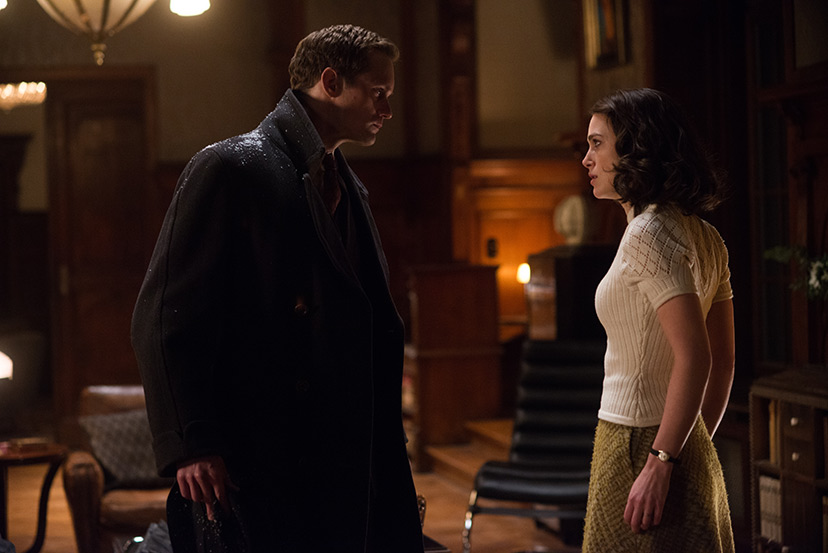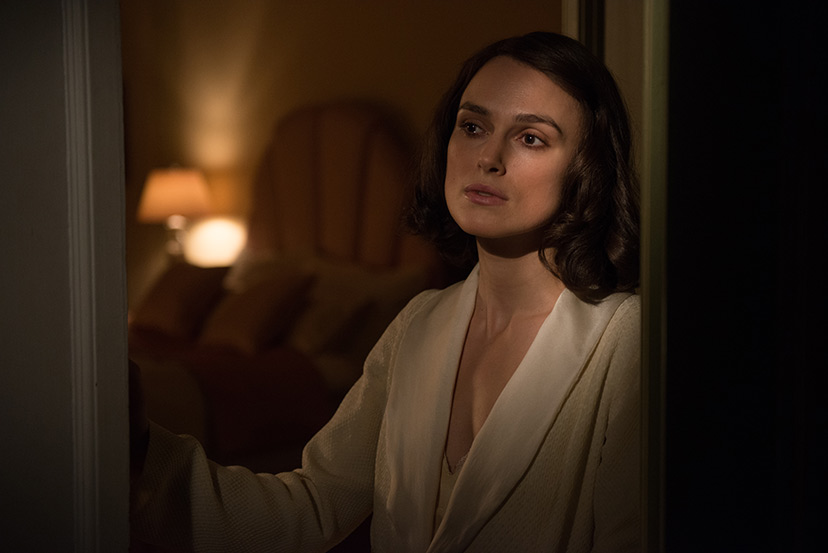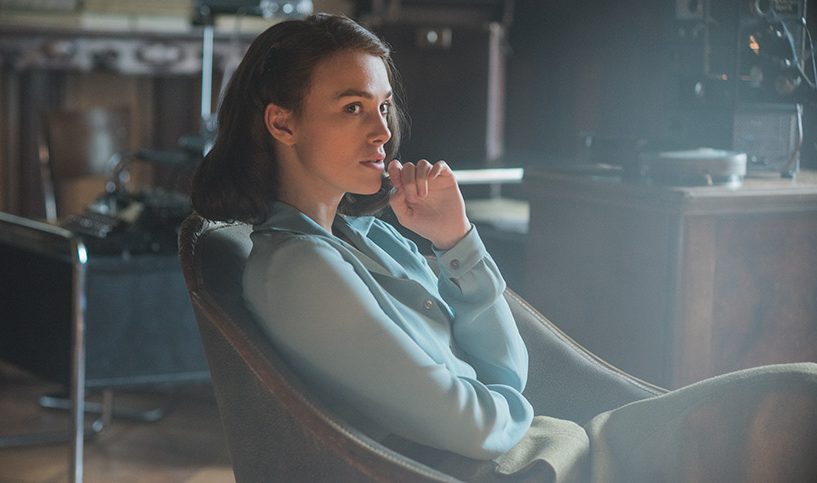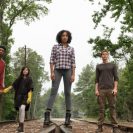Ms Knightley is Rachael Morgan who arrives in Hamburg to be reunited with her husband, Lewis Morgan (Jason Clarke), a British army officer serving with the occupying Allied forces who controlled Germany immediately after the end of the Second World War.
Morgan has requisitioned a grand house where he will stay with Rachael – common practice in the months after the conflict ended – but has allowed the German owner, Stefan Lubert (Alexander Skarsgård) and his daughter to remain in the property.
At first, Rachael is resentful at the prospect of living with the enemy as she tries to rebuild her fractured relationship with her husband, as they both struggle to come to terms with the death of their child. But she discovers that Lubert, too, is grieving the loss of his wife who died during the intense Allied bombing of Hamburg in 1943 when a large section of the city was obliterated in a firestorm that killed more than 40,000 people.
“Rachael is somebody who has been utterly shattered by grief,” says Ms Knightley.
“Her emotional interior life is escaping through every single pore in her body and she comes to see her husband amidst the destruction of this German city amongst these people who she very much still sees as the enemy and meeting her husband who she hasn’t seen for years, properly, and they are now two different people.
“So Rachael is shattered – she is not a whole person at the time you meet her she is being held together by very taut skin.”
With her husband increasingly emotionally and physically absent, Rachael slowly begins a relationship with Lubert that threatens her marriage.
“For me personally – and this isn’t the way that everybody sees it – I sort of saw the affair with Lubert as having two parts to it. In some ways Rachael recognises Lubert’s own tragedy and his own grief and the fact that becaus it’s not shared there’s an understanding.
“But the distance is enough that it doesn’t affect Lubert to be able to be there emotionally for Rachael in a way that Lewis absolutely cannot be because it’s shared grief for them.
“So I think there’s that. And also, an explosion has to happen between Rachael and Lewis for them to be able to get back together because something has to bring it to a head and I think in a way we do know that with relationships – you are aware when there has to be a bomb that has to go off to get through something.
“I’m not saying that always has to be infidelity, but I should imagine that sometimes it is.
“It’s this moment when there can be something other than the living experience of trauma and they can just have this amazing thing, it’s like a holiday romance. It’s being alive and suddenly feeling and not having to re-live all of that grief but being two solo entities that have nothing to do with each other’s past.
“She must have suddenly felt like she could breathe again and was alive again.”
Ms Knightley was immediately drawn to the screenplay, which is based on an original story by Rhidian Brook who also wrote a novel, The Aftermath, and its themes of love and loss.
“I think it was the idea of rebuilding and how that is possible after tremendous tragedy, both in terms of the emotional storyline with Rachael and then the physical rebuilding of cities after they have been destroyed.
“I felt like the 1940s and the Second World War was a period that I’ve done in quite a few films but I’d never looked at the aftermath of a conflict before and I thought that was a really interesting take on it.”
The production filmed interior scenes at the Lubert house at a 19th century property on the outskirts of Hamburg. The exterior scenes, showing a devastated post war Hamburg, were filmed in Prague in freezing, snowy conditions.
“We got to Prague and it was the coldest winter since 1937 and it was about minus 16 most of the time we were filming – it was absolutely freezing and there was this blanket of snow the entire time we were there.
“It almost looked fake. I’ve never seen that amount of snow before and it really was quite extraordinary so we were very lucky and very cold at the same time,” she laughs. “And (production designer) Sonja (Klaus) did a wonderful job of recreating the devastation of Hamburg which looked incredibly real.”
She had worked with Clarke on Everest – he played a mountaineer who died on the mountain and Ms Knightley was his wife – and was delighted to team up with the Australian actor once again.
“I absolutely love working with Jason. I love it. He is a phenomenal actor and I really like him as a bloke. We have a lot of fun, which is funny because on Everest I was sobbing the entire time and on this one we’re playing a couple wrenched apart by grief.
“But honestly, this whole job was one of the loveliest, if not the loveliest job I’ve been on and that was hugely to do with James Kent who I think is the nicest man I’ve ever met.
“Honestly I can’t tell you how lovely this group of people are. I get a huge kick out of working with Jason. I learn a lot from him and I so enjoying playing around with him, he’s great.

“And Alexander is just another lovely, lovely man. He is a wonderful actor and a complete sweetheart. This film felt like a real privilege because it’s very rare that you can say, hand on heart, that everybody was spectacularly lovely. It was a privilege working with all of them.”
Ms Knightley has twice been nominated for an Academy Award; Best Actress for Pride & Prejudice and Best Supporting Actress for The Imitation Game. The daughter of actor Will Knightley and playwright Sharman Macdonald, Ms Knightley was born in London and made her professional acting debut as a nine year old in the British TV movie, A Village Affair.
At 12, she played Sabe, the decoy queen to Natalie Portman’s Queen Amidala in Star Wars: Episode 1 – The Phantom Menace. Three years later she played tomboy soccer player Jules Paxton in Bend It Like Beckham. The film was a huge box office success and Knightley became of the hottest young stars in the world.
Her other film credits include Pirates of the Caribbean: The Curse of the Black Pearl Love Actually, King Arthur, The Jacket, Domino, Pirates of the Caribbean: Dead Man’s Chest, Atonement, The Edge of Love, The Duchess, Never Let Me Go, A Dangerous Method, Anna Karenina, Jack Ryan: Shadow Recruit, Laggies, Everest, Collateral Beauty, Pirates of the Caribbean: Dead Men Tell No Tales and Colette.
Why this film, and how did you connect with this story?
I think it was the idea of rebuilding and how that is possible after tremendous tragedy, both in terms of the emotional storyline with Rachael and then the physical rebuilding of cities after they have been destroyed. I felt like the 1940s and the Second World War was a period that I’ve done in quite a few films but I’d never looked at the aftermath of a conflict before and I thought that was a really interesting take on it.
I was trying to think of a film set in that period and couldn’t find one. Could you?
No it’s sort of unimaginable because you think about the end of the war being ‘we won, they lost’ and good guys and bad guys and all of that and you never think about the emotional and physical landscape afterwards and how the hell you actually get back from that point of destruction where instead of seeing people as enemies suddenly seeing them as human beings again.
And indeed, once you have been through such huge trauma how you begin to live again. We see the Second World War as the people who won and the people who lost but actually if you lost somebody close to you it doesn’t matter if you were on the winning side or the losing side, there are no winners. And it’s how you come back and how you rebuild your life after that – it’s something that really struck me when I was reading the script and I hadn’t seen a film that was about that. Maybe there has been one but I can’t think of it.
The house where you filmed the interiors is an extraordinary place. Would you say it’s almost a character in the film?
Yes, it was an extraordinary place to shoot and we were there for just over a month and it was sort of in the middle of nowhere about an hour or so out of Hamburg and it was this Gothic style, very Germanic house. And we were there so much and we really inhabited it and that house becomes a strange character in the film because it’s so atmospheric.
Let’s talk about Rachael, the woman you play. How would you describe her?
Rachael is somebody who has been utterly shattered by grief. Her emotional interior life is escaping through every single pore in her body and she comes to see her husband amidst the destruction of this German city amongst these people who she very much still sees as the enemy and meeting her husband who she hasn’t seen for years, properly, and they are now two different people. So Rachael is shattered – she is not a whole person at the time you meet her she is being held together by very taut skin.
Rachael has suffered the loss of her son during the war. When she arrives in Hamburg to be with her husband does she still see the German people as her enemy?
Yes and that’s what I found really interesting about it and of course she does see these people as her enemy. There have been six years of war where people have literally been killing each other and you have to see the enemy as the enemy.
And not only that a bomb has fallen from the sky and they’ve killed the thing in the world that she loved the most, her son, and I think she blames every single German for that because of course a bomb is faceless – you don’t know who has killed your son, it’s some faceless thing that fell from the sky but you do know that it was German and so every single one of those people is still her enemy.
And that’s what I found so interesting about her because that is so awful and completely understandable at exactly the same time and her journey, if you like, is seeing that enemy with a human face and seeing that the terrible tragedy that has happened to her, happened to her people and her country, has also happened to the other people in the other country.
And that is a tremendous personal journey, I should imagine, for somebody to be able to make. And that’s why I found her so impressive – you can start a film in a place of hatred for these other people and at the end she has gone through this journey of acceptance that everybody lost. And so it’s ground zero and you have to build everything up again.
The sense of loss is ever present in the film. All of the many characters, including yours, are wounded by this sense of loss aren’t they?
Yes, I think they have all been utterly changed and whoever they were before they experienced that they certainly aren’t any longer. I think they are all occupying a space where they don’t really know who or what they are because everything has changed. And I was really interested in the relationship between the husband and wife, Lewis and Rachael, because you are married to this person and you don’t know who you are and he doesn’t know who he is and you sure as hell don’t know who each other is. And how does that work? How can you come back together when you are faced with somebody who should be the person that you know the best in the world and you suddenly look at a face you know but you have no concept of who that person is anymore.
And in a small way, I think that’s what happens to most relationships over time – you can look at a partner and you see a huge change and you go ‘oh my God, I’ve blinked and I suddenly can’t quite reach you anymore.’ And I think that’s what I was interested in because this is a very extreme version of that but really I think it’s something that most adults can connect to within that story of suddenly being with a person that you don’t quite recognize anymore.
This is a more extreme version of that but with each of them I think there is that sense of finding that new identity and that sense of how you live in this world that is literally utterly destroyed and emotionally utterly destroyed. How do you get through that and come out the other side? And that’s what many people had to do after the Second World War because so many were in that place. And it’s a very interesting thing to think about because that’s a huge undertaking to pick yourself up and rebuild yourself and your relationship.

We mentioned the house before and it represents so much because when Rachael first arrives she is confronted by the enemy – the German family – living there. It’s also very grand with beautiful paintings on the walls. What does that mean for her?
We felt that Rachael and Lewis definitely didn’t live in a house like that back in England. He was a schoolteacher, she was a schoolteacher and they were lower middle class and then she goes to Hamburg and suddenly she is living in a very aristocratic German’s magnificent house and I think that makes her feel small and uncomfortable and because she doesn’t quite understand the rules feels out of place. And the fact that Lubert is still there is kind of unimaginable really.
You also see the reality of what you have done is take somebody else’s home and it has all of their stuff in it and it’s one thing to move into that and manage to banish the imagine of the other people whose house it is but when they are still living there, there is this sense of where do you fit because you are living in their house and although they are not meant to be there, they are – they are in the attic and you don’t want to see them as human beings, you don’t want to have a conversation with them as human beings, you want them to be gone.
So the strange nature of taking somebody’s house, however huge and magnificent that home is, and moving yourself into it is such a bizarre notion and, of course, it happened to Jewish people when the Germans did that to them in World War II and then it happened again when the British moved in after the war ended. It’s that word, ‘requisitioning’ and it’s a really bizarre notion when you actually think about it – if it was your house imagine being told to leave one day and somebody else just moves into your life.
You must have enjoyed all the production design detail in the house – the artwork on the walls, the piano, the Bauhaus design? And that plays with Rachael’s stereotypical expectations of where the ‘enemy’ would live doesn’t it?
Very much so. And it’s always the case isn’t it, when one section of society is ostracised, you never see them as human beings you see them as the ‘enemy’ whatever that is and suddenly when you are confronted by things that they love, that they know so much about, that they are interested in, you see their humanity.
And when you have been through something in the way that Rachael has been through such loss, you don’t want to give up your sense of hatred, it’s difficult to let go of that. And particularly because that must have become a part of her, something that she could cling on to when her husband disappears and her son is killed, she can cling on to that hatred and it’s part of her identity and then suddenly that too is wiped away.
The film walks a very fine line with the affair that Rachael has with Lubert doesn’t it? Because the audience will want Rachael to mend her relationship with her husband but at the same time understand why she has an affair with Lubert…
Yes and that’s how I felt as well. It is a very delicate balance and that was something that we talked about a lot. But I think you have to see the complexity of that. For me personally – and this isn’t the way that everybody sees it – I sort of saw the affair with Lubert as having two parts to it. In some ways Rachael recognises Lubert’s own tragedy and his own grief and the fact that because it’s not shared there’s an understanding but the distance is enough that it doesn’t affect Lubert to be able to be there emotionally for Rachael in a way that Lewis absolutely cannot be because it’s shared grief for them. So I think there’s that.
And also, an explosion has to happen between Rachael and Lewis for them to be able to get back together because something has to bring it to a head and I think in a way we do know that with relationships – you are aware when there has to be a bomb that has to go off to get through something. I’m not saying that always has to be infidelity but I should imagine that sometimes it is.. It’s this moment when there can be something other than the living experience of trauma and they can just have this amazing thing, it’s like a holiday romance. It’s being alive and suddenly feeling and not having to re-live all of that grief but being two solo entities that have nothing to do with each other’s past. She must have suddenly felt like she could breathe again and was alive again.
Did you draw contemporary parallels from the story?
Yes and I think that’s why it felt so relevant. I think we see images of people who have lost as much as these people have every day. I think I’m always interested with period dramas where you can set something in 1945 and yet we can completely see the parallels with 2019. And I think that’s very powerful and that’s one of the reasons I was so interested in this.
You’ve worked with Jason Clarke before of course on Everest. Could you tell us about teaming up with him again on The Aftermath?
It never works out very well when Jason and I play husband and wife (laughs). In that one he dies and in this one our son dies so we should try and do one where we live happily ever after. I absolutely love working with Jason. I love it. He is a phenomenal actor and I really like him as a bloke. We have a lot of fun, which is funny because on Everest I was sobbing the entire time and on this one we’re playing a couple wrenched apart by grief.
But honestly, this whole job was one, if not the loveliest job I’ve been on and that was hugely to do with James Kent who I think is the nicest man I’ve ever met. Honestly I can’t tell you how lovely this group of people are. I get a huge kick out of working with Jason. I learn a lot from him and I so enjoying playing around with him, he’s great. And Alexander is just another lovely, lovely man. He is a wonderful actor and a complete sweetheart.
This film felt like a real privilege because it’s very rare that you can say, hand on heart, that everybody was spectacularly lovely. It was a privilege working with all of them.
Can you talk about your productions designer, Sonja Klaus, who has done an amazing job recreating the scenes of a devastated Hamburg?
It was extraordinary. We filmed those scenes just outside of Prague and I think it was a ruined factory that they built up with all the rubble. When I originally read the script for those scenes it had ‘snow, snow, snow’ written all over it. And one of the first meetings I had with production they said ‘well, of course we can’t afford to do the snow, so the snow won’t happen.’
And then we got to Prague and it was the coldest winter since 1937 and it was about minus 16 most of the time we were filming – it was absolutely freezing and there was this blanket of snow the entire time we were there.
It almost looked fake. I’ve never seen that amount of snow before and it really was quite extraordinary so we were very lucky and very cold at the same time (laughs). And Sonja did a wonderful job of recreating the devastation of Hamburg, which looked incredibly real.
Visit www.bazaar.town to access more exclusive content! This interview is exclusive to bazaar publishing in Kuwait and text and images are courtesy of 20th Century Fox Middle East, @20CenturyFoxMe on Instagram.











